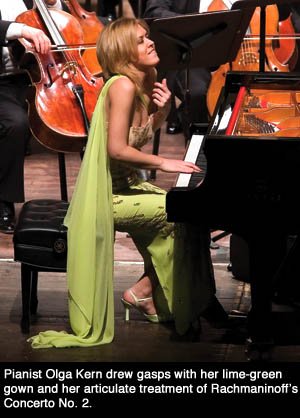Just Criticism
National Philharmonic of Russia, presented by CAMA. At the Arlington Theatre, Tuesday, February 27.

What do 32 massed Russian violinists sound like? The National Philharmonic of Russia (NPR) roared into town last week, courtesy of Community Arts Music Association, to answer that question, and much, much more. One hundred and eight strong, including Maestro Vladimir Spivakov and pianist Olga Kern, the NPR was founded in 2003 to spread a positive impression of contemporary Russia to the world by playing Russian-composed selections from the mainstream classical repertoire.
The main work of the first half of the concert was Rachmaninoff’s Piano Concerto No. 2 in C Minor Op. 18. Unison passages were as soulfully rendered and as meticulously controlled as the great solos. Pianist Olga Kern’s entrance in an ultra-glamorous green evening gown elicited gasps from the audience, as she more than met the challenge of post-Oscars red carpet fatigue. Her playing was precise and limpid, and she handled the Olympian demands of the “Allegro Scherzando” with aplomb. If at times Kern’s sound seemed slightly muted, this was nevertheless preferable to the more familiar “yelling match” approach taken to the piece’s finale by generations of keyboard showboats. In fact, the splendid treatment it received from Kern and the NPR went a long way toward undoing the stubborn paradox that clings to Rachmaninoff’s Concerto No. 2, namely, “no one likes it anymore-it’s too popular.”
Nothing so glib could ever be said about the evening’s symphony, which was Shostakovich’s No. 5 in D Minor, Op. 47. Written when Shostakovich was dangerously out of favor with Stalin, the work was initially understood as a celebration of Stalinism. Today it stands as the most vivid and controversial piece of evidence for the argument that Shostakovich remained a dissident, at least in his music, all along. The positive impression it made on Russian authorities in 1937 is neatly summarized in the official subtitle they imposed on it: “A Creative Reply to Just Criticism.” The work’s astounding range of moods and textures offers fresh surprises at every turn. The interplay of the solo winds and the harp in the third movement was particularly memorable this time. Daring dissent or party favor, the “Fifth” of Shostakovich continues to fascinate.



